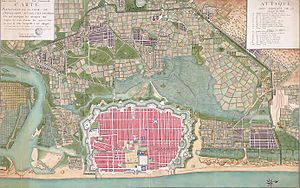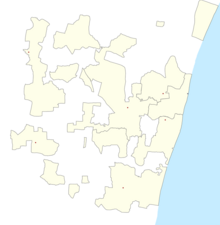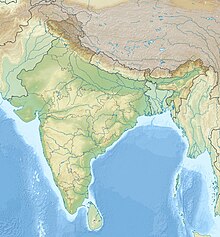
Back Assedio di Pondicherry (1793) Italian ポンディシェリー攻囲戦 (1793年) Japanese Осада Пондичерри (1793) Russian
| Siege of Pondicherry | |||||||
|---|---|---|---|---|---|---|---|
| Part of the French Revolutionary Wars | |||||||
 Defences of Pondicherry, 1778 | |||||||
| |||||||
| Belligerents | |||||||
|
|
| ||||||
| Commanders and leaders | |||||||
|
Colonel John Braithwaite Rear-Admiral William Cornwallis | Colonel Prosper de Chermont | ||||||
| Strength | |||||||
| 1,659 | |||||||
| Casualties and losses | |||||||
| 93 killed, 131 wounded | negligible losses, all captured. Pondicherry surrendered. | ||||||
Location within Puducherry | |||||||
The siege of Pondicherry was a colonial military operation in the early stages of the French Revolutionary Wars. Britain and France both controlled colonies on the Indian Subcontinent and when the French National Convention declared war on Britain on 1 February 1793, both sides were prepared for conflict in India. British India was centred on the principal ports of Bombay, Madras and Calcutta, administered by the East India Company. French India was governed from Pondicherry (modern Puducherry) on the Coromandel Coast. British forces in India were considerably stronger than the French, with the British Indian Army supported by British Army detachments and a Royal Navy squadron under Rear-Admiral William Cornwallis. Pondicherry's defenses were strong, but the garrison was too small to effectively man the walls, and although a French frigate squadron was stationed at the distant Île de France, it was unable to effectively protect the French Indian coast.
News of the outbreak of war took five months to reach the Indian Ocean but British forces, recently engaged in the Third Anglo-Mysore War, were mobilised in preparation and immediately seized the ports of French India. Only Pondicherry was able to resist, and a siege was instigated on 1 August 1793 by Colonel John Braithwaite while Cornwallis imposed a naval blockade. British forces constructed trenches and batteries, often under heavy fire, over the following weeks. Twenty days after the city was cut off, Braithwaite began a bombardment of the defences. Within hours the French commander Colonel Prosper de Chermont requested a truce, followed the next morning by an unconditional surrender.
© MMXXIII Rich X Search. We shall prevail. All rights reserved. Rich X Search

